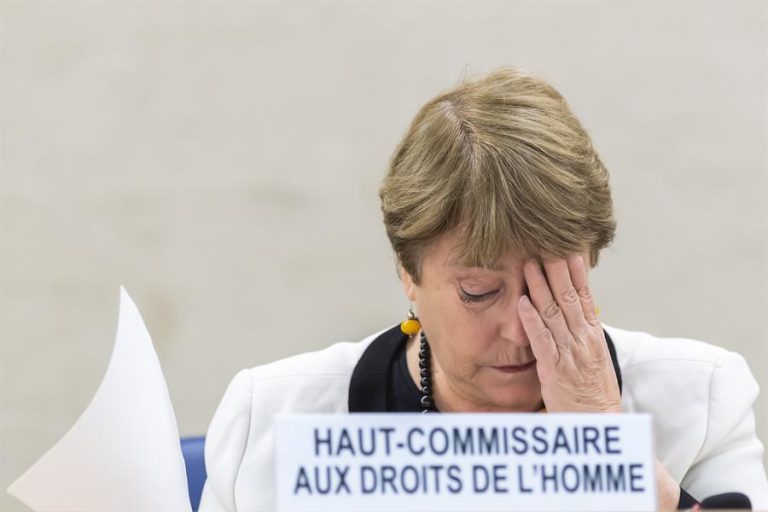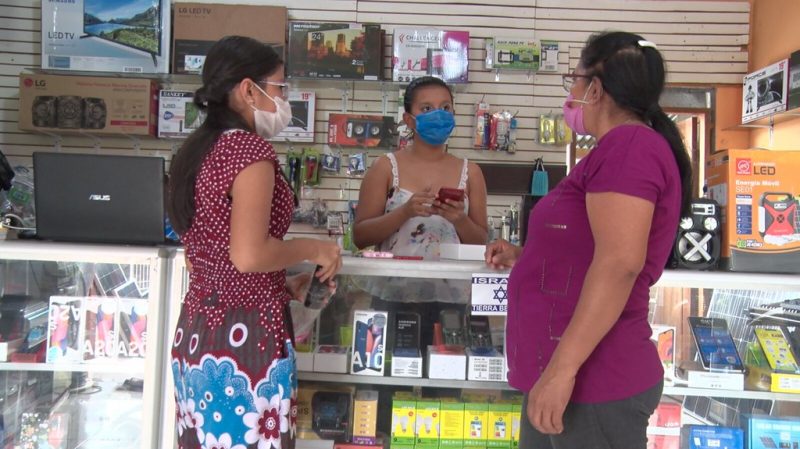2 de julio 2020

Children of Exile: The Births “Sowing Hope” in the Camp of Nicaraguan Farmers

PUBLICIDAD 1M
PUBLICIDAD 4D
PUBLICIDAD 5D
The UN High Commissioner for Human Rights warns that denying the impact of COVID-19 only “intensifies its seriousness”

The United Nations High Commissioner for Human Rights, Michelle Bachelet, lamented the way in which several countries, including Nicaragua are managing the COVID-19 pandemic.
“They’re denying the reality of the contagion,” and in this way they will only “intensify the seriousness of the pandemic by undermining efforts to slow its propagation and strengthen the health systems.” At the same time, she warned of a tendency in countries such as Nicaragua and El Salvador to use the emergency to repress the right to free expression and information.
Michelle Bachelet spoke during the opening of session number 44 or the UN Human Rights Council, celebrated Tuesday in Geneva. She criticized the actions of countries like Nicaragua that, in the context of the world public health emergency have dedicated themselves to persecuting those who criticize their management of the Coronavirus pandemic.
“In Belorussia, Brazil, Burundi, Nicaragua, Tanzania, and the United States, among others, I fear that the declarations denying the reality of contagion from the virus and the growing polarization about the key questions are intensifying the gravity of the situation,” she warned.
Nicaraguan doctors have been fired for denouncing the lack of health measures, the prohibition of speaking about the Coronavirus in order to avoid alarming the population and the official under-reporting of cases and deaths from COVID-19.
The Nicaraguan Ministry of Health (Minsa) affirms that in the week from June 23–30, only nine deaths from COVID-19 were registered in Nicaragua, for an accumulated total of 83 deaths from the pandemic. However, doctors’ reports affirm that in the German-Nicaraguan Hospital alone, one of the hospital centers set up to attend cases of COVID-19 up to nine people have died in a single day.
The Permanent Human Rights Commission backed Bachelet’s call, recalling that they are presently dealing with eight cases of doctors who were fired. These doctors were subject to vigilance from the police and agents of the special forces riot squad when they went to file their demand for reintegration in the Labor Hearings Room at the courthouse.
“Family members of doctors that have died have been threatened on social media and their houses have been painted with graffiti by activists that support Daniel Ortega’s regime. The same has happened with journalists for reporting on the advance of the pandemic and the lack of action on the part of a government that denies the reality of the Coronavirus,” the Permanent Human Rights Commission added in a communique.

A group of women buy medicine in a pharmacy in the Nicaraguan city of Muelle de los Bueyes. Photo reproduced from Esta Semana.
The poorest countries will be the ones most affected by the pandemic, and experts fear an imminent global food crisis. In addition, the high commissioner called attention to the use of the pandemic to repress the right to free expression and freedom of information in some countries, among them Nicaragua; or for abuses of power, in this case citing El Salvador as an example.
Bachelet noted that in “Russia, China, Kosovo, Nicaragua and many other countries I’ve seen reports of intimidation exercised against reporters, bloggers and civic activists, especially at the local level, with the apparent objective of discouraging criticism of the authorities and their response to COVID-19.”
“Censorship and criminalization of speech risk suppressing information that is crucial for confronting the pandemic,” Bachelet insisted.
The Coronavirus epidemic “threatens development and peace”, and demands that countries place their priority on giving more “not fewer”, civil, political, economic, social and cultural rights, stated Bachelet, formerly the president of Chile.
She urged countries to adopt “transformative measures” to strengthen the protection of human rights, promote public health, foster trust in their institutions and support greater social and economic resilience.
During her speech, Michelle Bachelet warned that if there isn’t “rapid and decisive national and international action, the pandemic will put an end to the hopes of achieving the 2030 Sustainable Development Goals.”
She asked for leadership “based on clarity, evidence and principles, for the protection of the most vulnerable,” and to confront the inequalities that the pandemic is augmenting.
As far as the most affected groups, she underscored the situation of minorities, women, children and the elderly. She further affirmed that members of ethnic and racial minorities, and indigenous peoples, are the ones most likely to die from COVID-19.
Bachelet highlighted Costa Rica and Panama as examples of countries that have exerted special efforts to protect their indigenous population and provide them with more services.
With regards to women and children, she pointed out that their exclusion and discrimination are aggravated by their lack of social protection, poorly paid employment, the burdens of caring for children and the elderly, and the fact that they have little participation in decision making.
She called the statistics regarding contagion and deaths in the nursing homes “alarming”, and asserted that these “suggest great deficiencies” in their care on the part of the national authorities.
Another segment that has been enormously affected are young children, on whom the pandemic has had “profound and long-term” effects. UNICEF foresees that this year some 15% of children (672 million) will be below the poverty line, and calculates that child malnutrition will affect 10 million little ones.
Youth, a sector that frequently works in the badly hit informal sector, will also confront a serious crisis, and this will affect the migration tendencies, since those under 30 years of age represent 70% of migrants.
Honduras and Panama, Bachelet notes, are two of the countries where migrants have been held in crowded conditions and with risks to their health.
Michelle Bachelet stated that a vaccine against the Coronavirus should be considered as a “world public good”, accessible to all notwithstanding their wealth, gender or migratory status.
“Prioritizing private benefits or political gains over public health,” will only bring us to repeated cycles of infection and will harm the economic recovery, she warned. She asked the wealthier countries to soften the debt burden and to invest in developing countries affected by the pandemic.
“The global socio-economic predictions point towards at least two years of dramatic decrease in the indicators of human development across the world,” a grave panorama. Given this, she asked for “close and concentrated attention on social cohesion, inclusion and justice.”
With information from EFE
Archivado como:
PUBLICIDAD 3M
Periodista nicaragüense, con dos décadas de trayectoria en medios escritos y digitales. Fue editor de las publicaciones Metro, La Brújula y Revista Niú. Ganador del Grand Prize Lorenzo Natali en Derechos Humanos.
PUBLICIDAD 3D